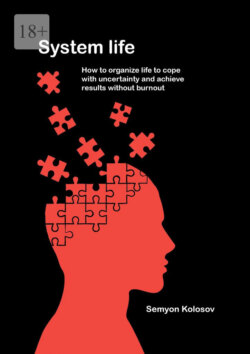Читать книгу System life. How to organize life to cope with uncertainty and achieve results without burnout - Семён Колосов - Страница 14
Chapter 1. Analysis
How to analyze your values?
ОглавлениеThe process is not easy. Not everyone can immediately catch the tendency for an emotional response from actions or thoughts about them. There are courses and books on the topic of finding your talents. They will help you delve into the topic and find new ways to get to the basic values and desires. Below there is a list of questions that will help you activate the necessary reasoning about your values.
1. Remember the moments when you were happy and experienced positive emotions. What was it about?
2. Remember when you were passionate about something that you lost control of time.
3. Remember when you did something during fatigue or in very uncomfortable conditions. What was that? Why did you find the strength?
4. What successes, deeds, results do you consider your achievements? What are you most proud of?
5. From what deeds, events or communication do you experience a surge of energy?
6. What do you not get tired of? What can you do at any time?
7. What kind of job or profession do you like? Why?
8. What is the most important thing for you in life? What are the principles of your life?
9. What does your ideal day and life look like? Where do you live, with whom, where do you work, what do you do in your free time?
10. What things do you want to have? Why do you need them? What needs are being covered?
11. What do you do in your free time? Why this one? Why do you value a hobby, and what does it give you?
12. What kind of business would you open? What value would you like to bring to customers?
13. In what field would you like to become an expert? For what?
14. What do you pay attention to when choosing a place of work? What prompted you to choose this profession and this field?
15. What goals do you want to achieve in the near future?
The answers to these questions will not give you a ready-made list of your values. This is just the tip of the iceberg, but you can already notice repetitions and trends of what you really like. Write down the answers in any form, compare them with the list of skills «what do you like to do» and «what do you do well, according to friends». Get more intersections or add to the list. If there are no obvious leaders, then you can try the «inner child» and «billionaire» techniques. Remember your childhood. When you didn’t think about success yet, but were sitting on your parents’ neck and doing what you like, without unnecessary thoughts. For example, in addition to football, I have always been fond of creating something. I liked to disassemble alarm clocks, tape recorders, toys and other things. From them I collected incomprehensible new mechanisms. Alarm clocks were a special buzz, they have a lot of details, and it’s very difficult to put them back together. My parents even had demands that I should not be given simple toys, otherwise I would be upset that they did not understand. Getting a computer in the ninth grade, I was sucked into the world of video and photo editing. Back then there was Paint and Movie Maker. I made shots with monkeys from videos, inserted the faces of classmates there and brought them to school on discs to laugh. I created maps for Counter Strike and installed everything where you can create something. In fact, nothing has changed now. I am driven by all the same processes. Only instead of alarm clocks, there is business, innovation, education and digital services. Although as a child, when asked who I wanted to be, I answered that I wanted to be a stuntman. I just really liked Jackie Chan. Remember what you could play for hours, what you did, what you dreamed about. Maybe then your desires were blocked by adults, they did not give you something to try, or there was no opportunity. Try to remember and find similar mechanics in adult activities.
If you don’t want to remember how poems were told on a stool as a child, then imagine yourself being Tony Stark. Imagine that you already have everything. You bought all the iPhones, houses, cars and islands. You showed it to everyone, got millions of likes and tons of envy. What will you do next? We dismiss charity and travel; these are endless affairs. Most likely, a dead end awaits you here. It turns out that people dream, but are not ready for wealth. Most of them can’t immediately answer what they will do. But if you think carefully and longer, then desires will begin to manifest. When I began to understand my desires and build my development vector around them, I began to get more pleasure from work, and it became easier for me to organize my life. I got rid of the focus and set priorities. Everything became clear.
I have devoted a lot to the topic of motivation and the definition of the path vector in this chapter, although the questions are to some extent philosophical, not practical. But it had to be done. It doesn’t matter how fast you’re going if you’re going in the wrong direction. Don’t worry if you’re not sure where you’re going yet. Just go through the stages of the system life and adjust the vector in time, if necessary.
